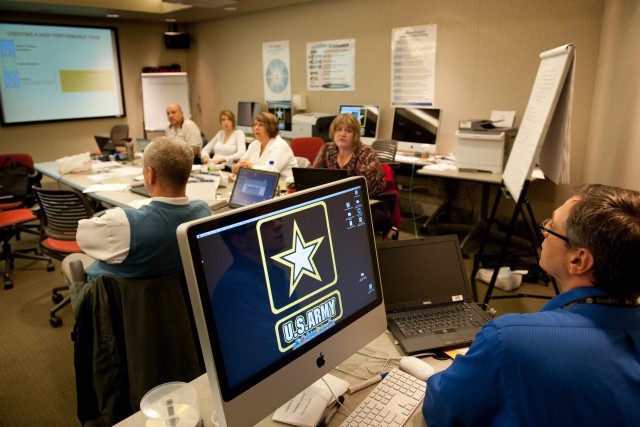ABERDEEN PROVING GROUND, Md. -- Thirty-one APG employees completed an important step Oct. 29 to bolster the civilian workforce for the Army and installation.
Students from several tenant organizations graduated from the Civilian Education System Basic Course, a two-week professional development class taught by the Army Management Staff College.
Gary Martin, executive deputy to the commander of the U.S. Army Research, Development and Engineering Command, said employee development is especially important at APG because of base realignment and closure.
"It took some time for us to really sort through how we were going to build the workforce here at Aberdeen," Martin said during the graduation ceremony's keynote address. "It will be great for the Army as we build multi-functional leaders that the Army needs.
"You represent the future of what's going to happen at Aberdeen. We're going to change the face of this installation, and it's going to be done through people."
APG Garrison Commander Col. Orlando Ortiz said the Army has a long history of investing in its officers and noncommissioned officers through training and education. Through CES courses, the Army is now building well-trained civilians, he said.
"Everyone realizes that our civilians need to be supported, trained and prepared for the offices they will be occupying in the future," he said. "Here at Aberdeen Proving Ground, we are moving forward with that initiative."
Ortiz gave the ceremony's opening remarks at the Ball Conference Center.
Philip Samudio, a basic course instructor with AMSC, discussed what he sees in the classroom.
"Basically, you can see when the lights go on and a student has an 'A-ha' moment," Samudio said. "That's when we know that they are using critical thinking and pulling everything together. For a teacher, it is a good feeling."
APG hosted the first CES course taught outside the AMSC campus in December 2009. Thirty-three civilians completed that training. The course is the first step in a federal employee's leadership training.
Martin encouraged the students to pursue the CES intermediate and advanced courses. Facing a future of fiscal restraint, the Army needs strong civilian leaders because of demands to become more effective and efficient with taxpayer dollars, he said.
Students said developing leadership skills is the most important benefit.
"Leaders are developed, not born, and I hope to get more of the education I need to develop my leadership ability," said Steve Wienecke, a cost and price analyst with the Communications-Electronics Command.
Tami Williams, a CECOM administrative officer, said the course will help advance her career.
"I want to get more insight on leadership," she said. "I know I need to learn more on leadership and develop the skills I will need to know before I get promoted."
Ortiz told the students that their new knowledge will be valuable if they implement the lessons when returning to work.
"Apply what you've learned. Don't accept the status quo," Ortiz said. "Use and draw upon what you've been exposed to during the course of your training. Apply it for your organization that will ultimately benefit the future of Aberdeen Proving Ground."


Social Sharing